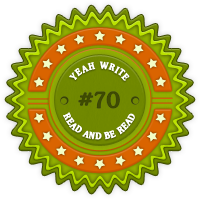For the
Scriptic prompt exchange this week,
Barb Black gave me this prompt: Write a piece based on your favorite nursery rhyme.
I gave
Grace O'Malley this prompt: You have three minutes to evacuate.
I did something a little different this week, working with two points of view, neither really the main character. Not sure if it worked out. I'm wondering if you can tell who is speaking in the first paragraph. And can you figure out the nursery rhyme?
This post was linked to
Yeah, Write.
